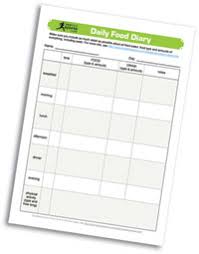Let’s start with some honesty: Keeping a food diary seems like a drag. Scribbling on a notepad amidst friends — “Was that seven croutons or eight, Karen?” — can feel awkward after every meal or snack. But in reality, logging what you eat really can help you lose weight and take a lot less time than you may think.
Tracking what you eat at each meal or snack can help you improve your health and lose weight for two major reasons.
First, you’re accountable to an observant yet nonjudgmental party (the trusty food log). Consistently logging your food helps you consider why and when you’re eating and how hungry or satisfied you feel. This record-keeping can help you have a more positive relationship with food in general.
Food Diary otherwise known as Food Journal or sometimes called diet journal draws your attention to food-related pitfalls that may have previously thrown you off-track and gives you the information you need to move forward from a place of honesty.
The second reason why it works is that provides you with a wealth of information about you. You’ll learn more about both the foods you enjoy (and don’t enjoy) plus the places and situations that you find yourself eating.
It can help you notice any negative feelings related food, and identify why you might be eating for reasons that have nothing to do with how hungry you actually felt.
The diary helps you and your doctor understand your eating habits. Follow the instructions below to get the most out of your food diary.
Read Also: Your Guide To Effortless Food And Drink Pairing
Food Diary as a Path to improved Health
You should include several pieces of information in your daily food diary. These are:
- How much: List the amount of the food/drink item. This might be measured in volume (1/2 cup), weight (2 ounces), or the number of items (12 chips).
- What kind: Write down the type of food/drink. Be as specific as you can. Don’t forget to write down extras, such as toppings, sauces, or condiments. For example, butter, ketchup, or sugar.
- When: Keep track of the time of day you eat.
- Where: Make note of where you eat. If you are at home, write down the room. For instance, at the dining room table, in the kitchen, or on the sofa. If you are out, write down the name of the restaurant or if you are in the car.
- Who with: If you eat by yourself, write “alone.” If you are with friends or family members, list them.
- Activity: In this column, list any activities you do while you eat. You could be working, watching TV, or playing a game.
- Mood: You also should include how you feel when you eat. Are you happy, sad, or bored? Your mood can relate to your eating habits and help you change them.
| How much | What kind | When | Where | Who with | Activity | Mood |
| 3 mini | chocolate chip cookies | 3:25 p.m. | office | alone | working on report | bored |
| 1 8 oz. | cheeseburger | 6:15 p.m. | Burger King | Claire, Jackie | talking | happy |
| 1 medium | french fries | “ | “ | “ | “ | “ |
| 1 medium | vanilla shake | “ | “ | “ | “ | “ |
| 1 cup | Haagen Dazs strawberry ice cream | 10 p.m. | kitchen | alone | watching TV | tired |
When keeping a food diary, some basic rules to remember are:
- Write everything down. Keep your diary with you all day. Write down everything you eat and drink, no matter how small it seems. Whether it’s a piece of candy, a small soda, or a big meal, the calories add up.
- Do it now. Don’t rely on your memory at the end of the day. Record your eating details as you go.
- Be specific. Record your food exactly how you eat it. If you have fried chicken strips, don’t just say chicken. Make sure you also include the extras. This could be gravy on your meat or dressing on your salad.
- Estimate amounts. If you have a piece of cake, estimate the size (2″ x 1″ x 2″). If you have vegetables, record how much you eat (1/4 cup). When you eat meat, a 3-ounce cooked portion is about the size of a deck of cards.
Things to consider
In order to succeed, your diary needs to tell the truth. You don’t gain anything by cheating to look good. If you have questions, talk to your doctor or a dietician. Share your food diary with them to plan changes to your eating habits.
Read Also: 19 Foods To Help Lower Your Blood Pressure
Questions to ask your doctor
- How often or long should I keep a food diary?
- What should my food diary tell me?
- Should I list vitamins, supplements, or other medicines?
This information provides a general overview and may not apply to everyone. Talk to your family doctor to find out if this information applies to you and to get more information on this subject.
